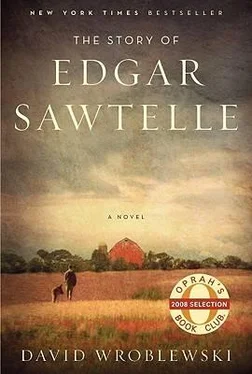They made beds in the living room for the third night and watched the glow from the field. Neither could sleep. They talked between long pauses.
I’ll take the chair tonight. You have the couch.
“No, I like it here.”
What were you looking for back there?
“Where?”
In the fire. It seemed like you were looking for something.
“I don’t know. I wasn’t looking for anything.” She changed to sign. Can I ask you a question?
Yes.
Are you scared?
Because of the funeral?
Because of everything.
No. Not scared. But I didn’t know it would be like this.
Neither did I.
They watched the orange firelight play against the limbs of the apple trees.
Do you think it will work?
Yes.
I like that the ground will be warm.
She looked at him. I’m very proud of you, you know.
Aren’t you supposed to tell me everything is going to be okay?
She laughed quietly. Is that what you want me to say?
I don’t think so. I don’t know if I would believe you if you did.
Lots of people are going to say it. I’ll say it too, if you want me to.
No. Don’t.
They were quiet, just looking out the windows.
Do you remember anything about your father? Your real father, I mean.
No, not a lot. He wasn’t around much. She paused, then shifted in her chair to face him. What are you thinking? You aren’t worried about going into a foster home, are you?
No.
Good. Because that’s not going to happen. Nothing is going to happen to me, or you, for that matter.
Anything can happen, though.
Anything can happen. But almost always, just normal things happen, and people have happy lives.
Were you happy before you met him?
She thought about that a moment.
I don’t know. Sometimes I was happy. As soon as we met I knew I was unhappy without him.
How was it you met again?
She smiled. In a good way. You’d only be disappointed in the details.
You aren’t ever going to tell me, are you?
I will, if you have to know.
He thought then about all the stories his parents had drawn out, how his father, usually so serious, had enjoyed the game of it and how that made him enjoy it, too. To know that one story was truer than all the rest might make it as if those moments had never happened. And perhaps it was better if they’d met many times, in many circumstances.
No, he signed after a while. Don’t tell me. He motioned toward the orange blaze in the field. Should we take anything else out?
I think they’re getting on just fine.
Good night, then.
“Good night,” his mother whispered. After that they were quiet.
IN THE CHAPEL, THERE WAS the casket in the front, and from the moment he saw it Edgar stopped remembering things in order. The drone of the minister’s sermon. Candles burning. Doctor Papineau sitting with them up front. At one point, he turned to view the mourners, thirty or forty scattered throughout the pews. Claude’s was not among the faces he saw. Afterward, they sat in Doctor Papineau’s car and followed the hearse along the main highway, onto County C, turning at last up Town Line Road and passing through the overhang of trees. They stopped where Edgar had cut the fence. Glen Papineau was one of the pallbearers, as was one of the men from the feed store. In all, a dozen of them walked across the field. Graveside, the man from the funeral home began to speak. Snatches rang back from the barn, as if endorsing only a fraction of his words.
Then a pair of headlights flickered through the bare trees. A car came to a stop and Claude appeared at the path entrance. More cars and pickups began to appear in a long line. The proceedings stopped and everyone turned. Doors opened, slammed, voices rang tinny in the cold air. Claude waved someone along. A man leading a dog. It was Art Granger and Yonder, both limping with arthritis. Then Mr. and Mrs. McCullough, with Haze, the third Sawtelle dog their family had owned. Then Mrs. Santone, with Deary. Then a lone woman with her dog, a curve of slack in its leash. A young couple with a boy and their dog. The dogs’ exhalations plumed whitely over their heads as they came down the field. For a long time people kept appearing at the top of the path-trainers who had adopted yearlings, men whose voices had sped across the telephone lines in conversation with Edgar’s father-and Claude directed them along. There was a man Edgar recognized from Wyoming; another from Chicago. But most were from around that countryside from homes that looked after Sawtelle dogs. Claude stayed on the road and directed them all down the path until the last of them had passed and they all stood in long arced rows around the birches.
Edgar looked at the dogs and then across the field at the house. Trudy wrapped her arms around him and whispered, “No, please stay,” as if she thought he meant to run from it all. But she misunderstood and he could not explain. He twisted away and crashed through the snowdrifts toward the house. No sound but the roaring in his ears. Twice he fell and pushed to his feet without looking back.
When he swung the kitchen door open, Almondine stood waiting for him. He knelt and let her chest fill over and over in the circle of his arms and together they returned to the birches, Almondine stepping along in the path he’d broken through the crusted snow. When they reached the rows of people and dogs, Almondine pushed ahead, passing through the ranks until she stood graveside. Then Edgar walked up and put his arms around his mother and they surrendered to whatever unearthly wind it was that howled over them and only them and Almondine sat her wise haunches down beneath the birches and together they watched the casket descend.
THEY’D BROUGHT WITH THEM pies and casseroles, sliced cheese and ham, bowls of black and green olives and sweet pickles, miniature slices of bread fanned like playing cards next to saucers of mustard and mayonnaise. People milled around Edgar and Trudy, murmuring reassurances, pressing hands on their shoulders. Almondine passed through the crowd, quietly presenting herself. Many of the owners stayed outside with their dogs. Claude and Doctor Papineau held leashes so the owners might come in to fill their coffee cups and speak with Trudy. To those who had traveled far, she offered room to stay, but no one accepted. They wrapped gloved hands around coffee cups and walked back outside, stopping to settle their hats before opening the door. Claude took those who wanted into the barn to see the kennel.
Husbands began to come in to let their wives know the car was running. The last of the women washed and dried dishes while cars turned around in the driveway, headlights sweeping the living room walls. Someone came asking for jumper cables. The women patted their hands on dishtowels and took their coats from the pile on the bed. And then only three visitors remained: Doctor Papineau, Glen, and Claude. They stood on the back porch in the bluing dusk. Doctor Papineau opened the kitchen door.
“We’ll take care of the dogs,” he said. “Don’t argue. Go lie down.”
Trudy nodded. “When you’re done, come get some food,” she said. “There’s so much left.” But afterward the trio walked up the drive. Two pairs of headlights brightened. Edgar watched the cars pull away. He mounted the stairs and pulled off his clothes and fell into bed with barely the strength to thump the mattress for Almondine. As soon as she’d settled herself beside him, he was asleep.
The Letters from Fortunate Fields
T HERE FOLLOWED, FOR EACH OF THEM, GOOD DAYS AND BAD, and often Edgar’s best moments coincided with his mother’s worst. She could be cheerful and determinedly energetic for days on end and then one morning he would walk downstairs and find her hunched at the kitchen table, haggard and red-eyed. Once lapsed, nothing could deliver her. It worked the same with him. Just when normal life felt almost possible-when the world held some kind of order, meaning, even loveliness (the prismatic spray of light through an icicle; the stillness of a sunrise), some small thing would go awry and the veil of optimism was torn away, the barren world revealed. They learned, somehow, to wait those times out. There was no cure, no answer, no reparation.
Читать дальше
Конец ознакомительного отрывка
Купить книгу












